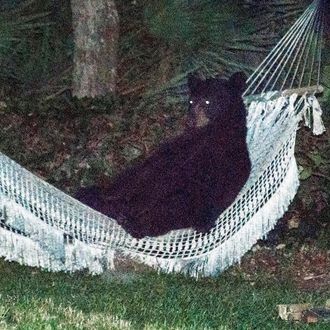
Florida decided that something had to be done to reduce the number of black bears interacting with humans, who have increasingly been encroaching on their traditional settlement areas, with sometimes unfortunate results.
The state took the measured response of initiating a weeklong statewide bear hunt for the trash-hungry omnivores. It doled out more hunting permits (3,779) than the last known count of the bear population (3,300). The first weekend of bear bloodbath was such a success that officials had to call off the hunt after only 48 hours. The bear body count by that point had already reached 295.
The wildlife commission had set a cap of 320 bears, nearly 10 percent of the state’s bear population.
Biologists with Florida’s wildlife commission say the high numbers point to a robust and fully recovered bear population.
Just three years ago, the black bear was on the state’s endangered-species list. The population was bouncing back from a low of around 300 in 1970, down from 11,000 at its mid-century peak. Hunting was suspended in 1994.
One reason for the “success” of the hunt, besides the zealousness of men in camouflage (approved weapons: shotguns, bows, pistols, revolvers, and crossbows; Ted Nugent also joined in), is, as one official put it, the sheer naïveté of Florida’s wild black-bear population. Having not been hunted in two decades has left the population a bit soft in the stomach. “The bears haven’t been hunted in 21 years, so they’re relatively naive,” said one wildlife official to the Tampa Bay Times. In fact, humans are largely to blame for bears being so “meh” about humans, as another official told National Geographic: “If an animal receives food enough so that it loses its fear of people, becomes used to people […] Bears did not become this way without people’s help.”
Activists throughout the state were inflamed by the Fish and Wildlife Commission’s decision to authorize the hunt. The commission was flooded with 40,000 public comments and letters during the public comment phase. Nearly 75 percent of respondents pleaded with the commissioners to vote no on the culling. But many sportsmen decried the activism as effete urbanism. As one prominent land developer told the Orlando Sentinel, “They [protesters] can’t rule what everybody else wants. The protesters, in my opinion, are the vast minority of people. They’re not hunters. They live in the city. They probably wouldn’t even want to go out in the woods, you know?”
Groups opposed to the hunt offered simple alternatives to the hunt like trash management and reducing the odors of human food, along with bear-proof receptacles to curb bears from roaming near houses and developments. But that would be no fun for the hunters, said one Central Florida hunter to CBS News, “They do a lot of damage on the property,” he said. “It’s nice being able to take this one out.”
The apparently eager desire to kill bothers conservationists the most. “Florida’s strategy to allegedly reduce human-bear conflicts [through hunting] is predicated upon attracting trophy hunters and it’s akin to a crime control strategy that involves shooting generally into a crowd,” the president of the Humane Society of the United States recently told National Geographic.





























